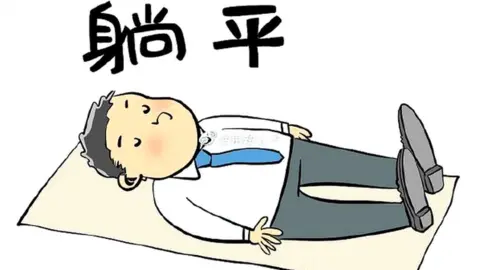China's new 'tang ping' trend aims to highlight pressures of work culture
 Sina Weibo
Sina WeiboYoung people in China exhausted by a culture of hard work with seemingly little reward are highlighting the need for a lifestyle change by "lying flat".
The new trend, known as "tang ping", is described as an antidote to society's pressures to find jobs and perform well while working long shifts.
China has a shrinking labour market and young people often work more hours.
The term "tang ping" is believed to have originated in a post on a popular Chinese social media site.
"Lying flat is my wise movement," a user wrote in a since-deleted post on the discussion forum Tieba, adding: "Only by lying down can humans become the measure of all things."
The comments were later discussed on Sina Weibo, another popular Chinese microblogging site, and the term soon became a buzzword.
The idea behind "tang ping" - not overworking, being content with more attainable achievements and allowing time to unwind - has been praised by many and inspired numerous memes. It has been described as a spiritual movement.
"Sending resumes was like fishing for a needle in the ocean," a lab technician named only as Wang told AFP news agency.
"You're beaten up by society and just want a more relaxed life... 'lying flat' is not waiting to die. I still work, but just don't overstretch," the 24-year-old said.
News site Sixth Tone reported that a "tang ping" group created on the IMDb-like platform Douban had attracted 6,000 members.
However, along with the original Tieba post, the Douban group has since been deleted, and searches for the hashtag #TangPing have been banned on Sina Weibo in an apparent effort by censors to prevent people seeing the scale of the new trend.

Increased pressures on China's youth
By Kerry Allen, China Media Analyst
There have been similar trends in recent years. In 2016, pictures of a Chinese actor slouching in a 90s sitcom became a popular meme. The following year, young Chinese netizens went wild for a "depressed egg" Japanese cartoon character called Gudetama.
At the time, the Sixth Tone news website noted the rise of what it called "sang culture" or quite literally, a "doomsday culture", factoring in young people's "reduced work ethic, a lack of self-motivation, and an apathetic demeanour".
Such trends come in light of the increased pressures placed on young Chinese citizens. This demographic have grown up under the one-child policy, and are expected to work longer hours than their predecessors - a population twice as large that is increasingly retiring.
Today's population of young Chinese also face greater pressures to show they are "socially responsible" by complying with new rules set under China's controversial social credit system, and they are constantly being urged to show their nationalism by boycotting a never-ending list of foreign companies and brands.

